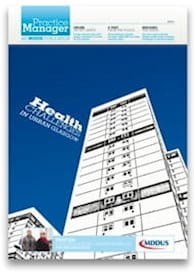TODAY it seems hard to imagine life without access to a computer and use of the internet. From routine tasks such as grocery shopping to buying music to ordering repeat prescriptions – how we use the web is changing day by day.
This presents a unique challenge to employers. You want to be able to place trust in your staff and fully restricting access to the internet for non-work related reasons is perhaps not the best way to foster such trust. So what guidelines should you put in place to avoid abuse and other potential issues that may arise?
A clear internet policy is a must in any practice and all employees should receive a copy of that policy on commencing employment. Current staff also need to be reminded on a regular basis of internet policy and managers should revisit those policies on occasion at team meetings to raise awareness of the content.
One might hope it would be obvious to employees that accessing pornography, gambling or other such web sites in a work setting is clearly inappropriate. But it always makes the process of potential disciplinary action easier if there is an explicit policy stating what is unacceptable and also what the repercussions will be if that policy is ignored (i.e. possibility of immediate dismissal). Apart from appropriate content you should also be clear when and how often non-work-related access to the internet is acceptable. Some offices will restrict use of non-work-related sites to the lunch period or may block access to certain sites.
Appropriate use of social media should also be spelled out in practice IT policy. Facebook, Twitter, blogs or personal websites can blur the boundaries between personal and professional life and it should be made clear to employees that all communications related to the practice must be respectful and not a forum to disparage the organisation or anyone working in it. The use of the practice logo or pictures of any activities within work time should not be used without express prior permission. You may wish to have as part of your internet policy that mangers are not social network “friends” with other employees to avoid the potential conflicts of interest that can come with this.
Another serious risk involved in staff discussing work-related issues on social media sites is the potential for breaches in patient confidentiality. Even just the mention of a patient, named or not, could be deemed a breach and lead to a complaint or legal action.
A practice internet policy should make it clear that employees must not use any internet site to harass bully or intimidate other employees, for example any comments in relation to their race, religion, gender, sexual orientation colour or disability. Sexually suggestive comments and threats to stalk or intimidate other members of staff should also be spelled out as unacceptable.
Policies should extend beyond computers to the use of mobile and smart phones. Not only is the constant use of mobile phones distracting and disruptive to an employee who should be busy at work, it also does not give a professional impression to patients and other staff.
Another common question we hear on the employment law helpline at MDDUS is whether practices are entitled to act on information about employees posted on social media sites. The short answer is “yes”.
Deciding whether what goes on out-with the office has an impact on the working environment can be a fine line but clearly any remarks that directly affect the practice and those who work in it may be in a position to be acted upon. Evidence of dishonesty or other activities may come to light via social media. For example, you might spot a photograph posted on Facebook of an employee signed off work for a sore back dancing in a nightclub over the same period. It may not be a blackand- white situation but you can certainly use this as a basis for discussion and/or investigation with the employee.
Recent case law has also highlighted the dangers of employees sending or forwarding information from their home PCs into the workplace – again this can be deemed unacceptable if the material contained in the email is offensive in any way. So it’s best to warn employees to think twice before forwarding that “funny joke”. Whilst some people may find it amusing, there is a chance that other colleagues may find it offensive. Remember the law looks not at how you intended the email to be taken but how the recipient perceived it.
Janice Sibbald is an employment law adviser at MDDUS
This page was correct at the time of publication. Any guidance is intended as general guidance for members only. If you are a member and need specific advice relating to your own circumstances, please contact one of our advisers.
Read more from this issue of Practice Manager

Save this article
Save this article to a list of favourite articles which members can access in their account.
Save to library

